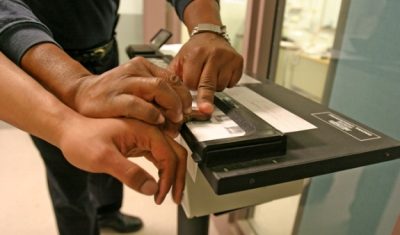Interior Enforcement

More States Voice Disapproval Over ICE’s Secure Communities Program
The national debate over ICE’s Secure Communities program has recently picked up more steam as several states’ have very publicly voiced disapproval. The program, which shares the fingerprints of individuals booked into jails with federal immigration databases, has been widely criticized for failing to target serious criminals, for increasing the potential for racial profiling, and for failing to be transparent. This week, Illinois Governor Pat Quinn sent a letter to ICE notifying them that Illinois had decided to discontinue its participation in the program and all jurisdictions previously activated were to be de-activated. Read More

Are SSA No-Match Letters Putting American Jobs at Risk?
BY TYLER MORAN, NATIONAL IMMIGRATION LAW CENTER The Social Security Administration (SSA) just announced it will resume its practice of notifying employers of discrepancies in employee paperwork through “no-match letters”—a mechanism which threatens countless American jobs. Despite the Administration’s clear assertion that the letter “makes no statement” about a worker’s immigration status, employer confusion over the letters has led to erroneous firings and lost wages in the past, and threatens to be the case now. It is anticipated that over 1 million workers will be the subject of these letters. Read More

Congresswoman Zoe Lofgren Demands Investigation into ICE’s Secure Communities Program
Some would argue that ICE’s Secure Communities program has been fraught with problems ever since it launched in 2008—from concerns over the lack of federal oversight to questions regarding the criminality of immigrants targeted. But after months of back and forth over how and whether jurisdictions are able to opt-out of this immigration enforcement program (which shares the fingerprints of individuals booked into jails with federal databases), California Congresswoman Zoe Lofgren (D-CA) has had enough. This week, Rep. Lofgren called for an investigation into the actions of federal immigration officials whom she said lied about whether states and localities had the right to opt-out of the program. Read More

Secure Communities Program Continues to Take Heat for Targeting Non-Criminals
At a conference last week, DHS Secretary Janet Napolitano raised a few eyebrows when she implied those who are fingerprinted through ICE’s Secure Communities program are presumably guilty of a crime—a particular sticking point considering the program’s reputation for sweeping up non-criminals. Although ICE officials claim the program targets criminal aliens, nearly 28% of people deported through the Secure Communities program are actually non-criminals. But that’s just one of the many problems immigrant advocate and community groups are voicing over this rapidly expanding program. Read More

New “E-Verify Self Check” Pilot Program is Not a Cure-All
BY TYLER MORAN, NATIONAL IMMIGRATION LAW CENTER E-Verify has a problem: Washington politicians want to force American employers to use the electronic employment verification system, but the system is still not ready for prime time. On Monday, the Department of Homeland Security (DHS) took a step toward remedying the database error rates by announcing E-Verify “Self Check.” This pilot program will allow people in select states and the District of Columbia to go online and verify their identity and authorization to work in this country—and to fix any errors before applying for a job with an employer who uses E-Verify. While a positive step, the pilot program is only one piece of the puzzle in fixing E-Verify and will likely be inaccessible to many—including the low-income workers who most need it. Read More

Police Forum Recommends Limitations on Investigating Immigration Status
The role of local police in immigration enforcement continues to be a complex policy and legislative issue at both the state and federal level. State legislatures, for example, are contemplating bills designed to increase the role of local police in immigration enforcement while federal legislation targets cities with so-called “sanctuary policies.” And as programs like 287(g), Secure Communities and other federal/local partnerships continue to expand, local police are now more involved in identifying undocumented immigrants than ever before. Many law enforcement officers, however, find that enforcing federal immigration law may interfere with their ability to prevent crime and keep neighborhoods safe, so they have designed tailored local policies to ensure that they maintain the best possible relationship with their communities. In a new report by the Police Executive Research Forum (PERF), local police speak out on the difficulties of enforcing immigration laws and talk about best practices for navigating immigration issues in the future. Read More

Georgia State Legislature Pursuing Budget Busting Solutions to Immigration
Washington D.C. – In the face of a $1.7 billion budget shortfall in fiscal year 2011, Georgia state legislators are currently pursuing anti-immigrant legislation that could further damage the state’s bottom line. House Bill 87, a copycat of Arizona’s SB1070, is currently working its way through the state legislature… Read More

New DHS Documents Highlight Internal Confusion Over Secure Communities Program
Since the Secure Communities program was announced in 2008, immigrant advocates have consistently asked whether the program is voluntary or mandatory. ICE’s response to the question has changed many times over the years. While ICE has said that the agency will eventually install Secure Communities in all state and local detention facilities nationwide (which makes it seem like a federal mandate), they have also indicated that the program is voluntary. After repeated questions about whether or not localities could opt-out of the program, ICE gave increasingly confusing and conflicting responses. This month, new documents recently released by DHS in response to a Freedom of Information Act (FOIA) only further highlight the internal confusion and shifting definition of the voluntary or mandatory nature of the Secure Communities program. Read More

Mandatory E-Verify is Not All It’s Cracked Up to Be
Today, the House Immigration Subcommittee held a hearing on the E-Verify system, a tool to help employers electronically verify that their employees have permission to work in the United States. Although E-Verify remains largely voluntary—except for federal contractors, employers in certain states that have made it mandatory, and a few other exceptions—some members of Congress and immigration restrictionists have decided that expanding E-Verify and making it mandatory will flush unauthorized workers out of the workforce, create jobs for unemployed U.S. citizens, and resolve our immigration problems. While everyone agrees that high unemployment levels must be addressed, simplistic measures like mandating E-Verify are not going to open up jobs for millions of unemployed workers. Read More

Mandatory E-Verify without Legalization Would Hamper Economic Recovery and Cost U.S. Workers Jobs
Since 1986, controlling illegal immigration by regulating who is entitled to work in the United States has been a key component of U.S. immigration policy. The ritual of showing proof of one’s identity and work authorization and filling out an I-9 form is part of every new hire’s paperwork haze. Read More
Make a contribution
Make a direct impact on the lives of immigrants.
